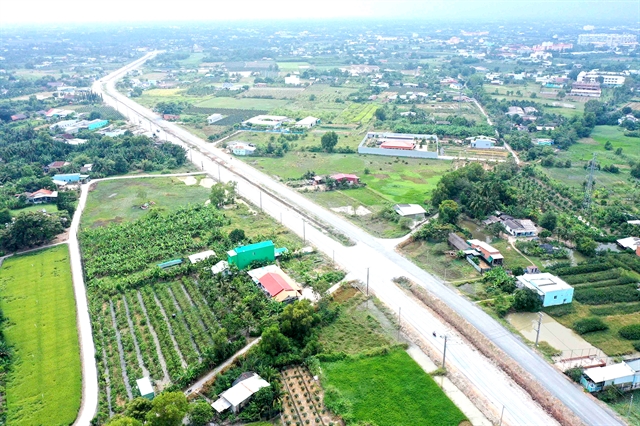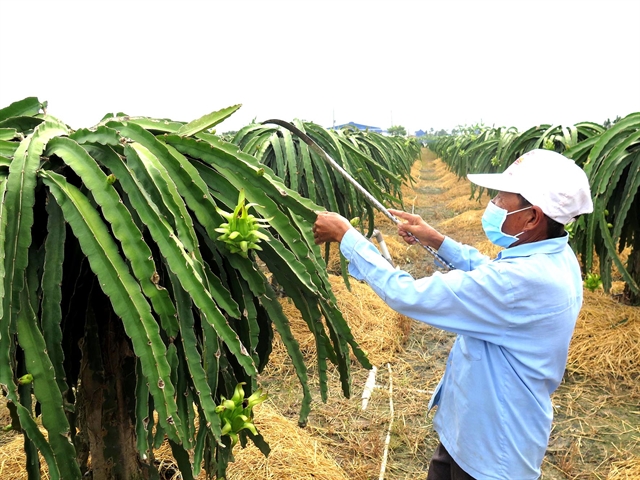Long An Province implements breakthrough programmes, key projects
Society – Economy - Ngày đăng : 09:54, 09/10/2024
 |
| The Tân An belt road section from National Highway No. 62 to the intersection of the National Highway No. 1 and Provincial Road 827B in Long An Province. – VNA/VNS Photo Vũ Sinh |
LONG AN – Long An Province has implemented breakthrough programmes and key projects envisaged under a resolution adopted at the 11th province Party Congress, term 2020-25.
Under the resolution, the province aims to maintain its leading position in the Cửu Long (Mekong) Delta in 2025 and become a well-developed province by 2030.
To meet the targets, the resolution has identified three breakthrough programmes: for high-tech agricultural development associated with restructuring the agricultural sector (agriculture programme), mobilising all resources to build a synchronous transport infrastructure system to serve industrial and urban development and for human resources training to meet industrial and agricultural development.
It has also identified three key transport projects which need to complete their construction in 2020-25: the Tân An City belt road and the Vàm Cỏ Tây River Bridge, Provincial Road 830E (section from expressway intersection to Provincial Road 830), Provincial Road 827E (section from HCM City to the Vàm Cỏ River).
The building processes at the three projects are being well implemented. For example, the construction of the Tân An City belt road and Vàm Cỏ Tây River Bridge has been completed.
The construction of Provincial Road 830E began in April this year, and the province Department of Transport is co-operating with relevant departments and agencies to resolve difficulties and issues regarding legal procedures for land clearance, and mobilise resources to accelerate the construction process.
For the construction of Provincial Road 827E, which will play an important role in connecting Long An with neighbouring provinces and the Mekong Delta, the province is mobilising resources to implement land clearance.
It has petitioned the Prime Minister to approve the construction of three bridges along the road and is selecting contractors for consulting and setting up projects to build access roads to the bridges.
The transport programme has focused on eight projects: Lương Bình – Bình Chánh road, Hựu Thạnh – Tân Bửu road, Provincial Road 826E (section from the Provincial Road 826C intersection to Cần Giuộc Bridge), the road connecting Rạch Dơi bridge to Provincial Road 826E, Đức Hoà dynamic axis (road connecting Provincial Road 822 - Provincial Road 823 - Provincial Road 823B - Provincial Road 825), Provincial Road 826D (Tân Tập – Long Hậu) section from Belt Road 4 to Provincial Road 830, upgrading and expanding the Provincial Road 824 section from Tua Một to Ranh Canal bridge, and Hùng Vương Street - the National Highway No. 62 intersection.
Of these the Hùng Vương Street – National Highway 62 intersection and Provincial Road 824 section have been completed, and the construction of Provincial Road 826D will be done in 2026 - 28.
The remaining projects are under construction, awaiting bidding to select contractors, or are in the feasibility report stage for construction under a public–private partnership.
Trần Thiện Trúc, deputy director of the Department of Transport, said: “The department will put in more effort in co-operating, consulting and petitioning to promptly resolve difficulties in implementing these projects, and will accelerate the construction processes and ensure their quality.
“The department will closely co-operate with district-level People’s Committees to resolve difficulties, especially land clearance, to ensure construction of these projects are on schedule.”
Human resources
Long An has taken various measures to improve the quality of its human resources and develop high-quality labour.
Its Department of Education and Training has co-operated with universities in HCM City and the Mekong Delta to provide tertiary education locally.
Its vocational training establishments and schools have co-operated with more than 200 companies in the province and elsewhere to provide vocational training in combination with providing jobs for local workers.
The rate of skilled workers in the province reached 74.7 per cent last year, with 33 per cent of them having vocational certificates, up from 71 per cent and 30 per cent in 2020, according to the province Department of Labour, Invalids and Social Affairs (DoLISA).
In the first half of the year the province provided training in growing rice, vegetables and fruits, cooking, machine repair, and other occupations for 2,617 rural people.
Nguyễn Đại Tánh, deputy director of DoLISA, said the training had basically met demand and aligned with the province’s socio-economic development and new-style rural area building.
“After learning vocational skills, most workers apply them in production and farming, achieving higher quality and efficiency.”
The province aims for 75 per cent of its workers to be provided with vocational skills and 35 per cent of them to have vocational certificates by 2025.
It also aims to develop vocational training in accordance with job market demands and meet the demand for human resources in high-tech agriculture and industrial development.
DoLISA has strengthened advocacy for vocational training and provided counselling for high school students on vocational pathways.
Nguyễn Hồng Mai, director of DoLISA, said the province was promoting co-operation between vocational training establishments and companies to train workers according to the needs of the latter.
It was also enhancing co-operation between vocational training establishments and schools in the province and beyond to provide more occupational skills for workers and improve training quality to meet the province’s demand for developing industry and agriculture.
High-tech agriculture
 |
| A dragon fruit orchard using high-tech farming methods including an automatic irrigation and smart humidity monitoring systems in Long An Province’s Châu Thành District. – VNA/VNS Photo Minh Hưng |
Đinh Thị Phương Khanh, deputy director of the province Department of Agriculture and Rural Development, said implementation of the agricultural programme for rice cultivation had helped address labour shortages by applying mechanisation and advanced farming techniques.
It had changed farmers' mindsets and farming habits, increased the use of organic fertilisers, biofertilisers and biopesticides, improved rice quality, and met market requirements, she said.
Production costs had decreased by 5 - 15 per cent compared to pre-programme levels, while profits had increased by 5 - 20 per cent, she added.
The province has more than 59,670 hectares of rice grown using technology, or 94.5 per cent of the target set for 2025.
It has zoned specialised areas for growing items such as dragon fruit, lime and vegetables using organic farming methods.
It has more than 7,000 ha under dragon fruit, 3,700 ha under lime and 2,000 ha under vegetables where farmers use high-tech farming methods, and their profits have increased by 15 - 20 per cent compared to traditional farming methods.
The province has instructed farmers to adopt high-tech farming models for rice, shrimp, beef cows, and other agricultural items.
Võ Thành Nghĩa, deputy director of the province Agriculture Services Centre, said the centre was co-operating with relevant agencies to enhance advocacy for high-tech rice cultivation.
“It will transfer advanced technology to farmers to meet the targets set for high-tech agriculture by 2030, especially the goal of developing 125,000 ha of high-quality, low-emission rice cultivation.” – VNS
